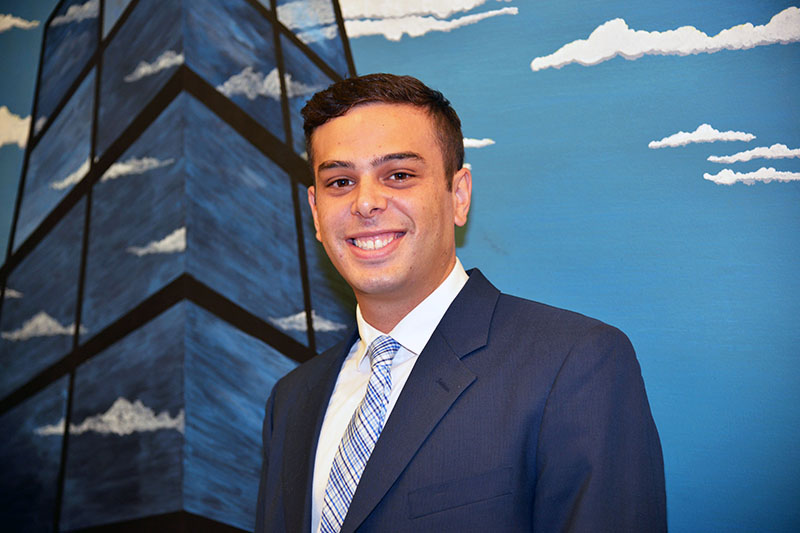 Jake Lorber decided to pursue a DePaul MBA degree to become better qualified for management positions. | Photo by Kathy Hillegonds
Jake Lorber decided to pursue a DePaul MBA degree to become better qualified for management positions. | Photo by Kathy Hillegonds
After Jake Lorber graduated with a bachelor’s degree in economics, he was convinced he was done with school. Following two years of working in financial banking in Northwest Washington, D.C., he yearned for a more challenging career, and continued to apply for positions within his company.
“Every time I would see a job opening, I would apply, but I would never get the actual interview, let alone the chance to get the job,” he says. “But I would always keep up with those job postings and see who would eventually get the role. I started noticing that the first three who were hired would have some type of graduate degree or an MBA.”
At that point, Lorber knew he should pursue a graduate degree – he just didn’t know where or what kind.
Once he decided to move to Chicago, Lorber researched graduate programs and met with friends and family to learn about the differences between an MBA degree and a Master of Science (MS) degree. “For the long term, I felt that if I had gotten a master’s in finance or wealth management, I would have pigeonholed myself in that specific area, whereas an MBA opened me up for anything business related, as well as the expertise to grow into a management position,” Lorber says.
He settled on the full-time day MBA program offered by the Kellstadt Graduate School of Business, and chose DePaul for its strong industry connections. Lorber, who currently works as a business performance analyst for TCF Inventory Finance, graduated from DePaul with an
MBA in Finance in 2016.
“A huge part of an MBA is the networking,” he says. “I felt that DePaul’s MBA program was going to give me a huge network in the Chicago area, and that network is eventually how I got the job I am working at now.”
MBA versus Specialized Master's Degrees
When it comes to choosing between an MS or MBA degree, students should consider their career goals and think about how they want to use the degree, says Kellstadt Director Christa Hinton.
“Our specialized master’s degrees are deep dives into specific areas,” she says. “The other aspect that is unique to Kellstadt is that we have faculty directors for each MS program, so students meet with them to get their counsel and are able to cultivate a special relationship that sets them up for success.”
 When it comes to choosing between an MS or MBA degree, students should consider their career goals and think about how they want to use the degree.
When it comes to choosing between an MS or MBA degree, students should consider their career goals and think about how they want to use the degree.
Kellstadt’s MS programs currently include 17 specialized business master’s degrees ranging from marketing analysis to computational finance. Two of the degrees—the MS in Accountancy and the MS in Taxation—also offer the flexibility of enrolling in face-to-face classes or taking the entire program online.
While these programs have a specific focus, the DePaul MBA gives students a broad-based education in business and is more suited for those who want to become managers or move up in their company. DePaul offers its
MBA in four formats and
15 concentrations.
“Career-changers are those who want to utilize skill sets to move over to a different industry or a different functional area,” Hinton says. “And an MBA, with the right concentration, can absolutely do that for a person.”
Personalized Career Counseling
Sandra Langston, who currently works as a human resources senior consultant for Northern Trust, thought she wanted to pursue an MBA. As part of DePaul University’s Corporate and Employer Outreach (CEO) initiative, Langston benefited from the tuition discount offered through her company’s partnership.
After meeting with a Kellstadt advisor, Langston learned more about the curriculum in the
MS in Human Resources program and decided an MS was the right fit.
Although Langston only enrolled in the program in spring 2017, she’s already been able to apply what she learned in her classes to her daily role. “So far, the courses in the MS in Human Resources program have introduced me to how, as a human resources specialist, I can use evidence to support different initiatives in HR,” she says. “I’ve been able to tie that to some of the things going on at the company.”
Langston has spent more than 20 years developing and supporting technology systems in human resources but hopes to use the MS degree to apply analysis techniques within a leadership role.
For students who need more guidance, Hinton recommends the
Kellstadt Career Management Center for one-on-one career counseling.
The Career Management Center also can connect students to alumni via the DePaul Alumni Sharing Knowledge network to explore university and career questions.
“We’re a very large program, but we’re very relationship-based,” she says. “Our faculty gets to know our students, our recruiting and admissions team gets to know our students and our academic and career advisors know our students. So, it’s a very personal experience for the team that works here, and we care about the success of our students.”
Learn more about
the DePaul MBA and business
master’s programs.